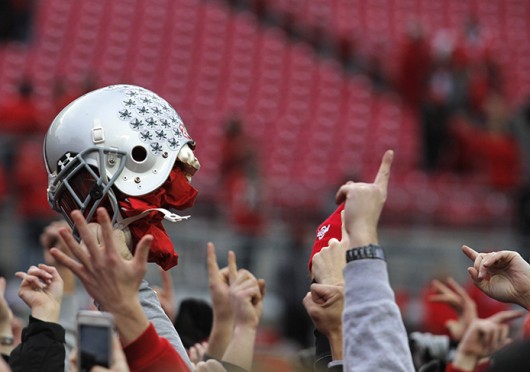
OSU fans celebrate on the field after a game against Michigan on Nov. 29 at Ohio Stadium. OSU won, 42-28.
Credit: Jon McAllister / Asst. photo editor
Michigan lost Nov. 29, but they really won.
Nevertheless, Ohio State fans and students left the Horseshoe on Nov. 29 with a sense of accomplishment one can only get from standing idly and watching a group of men sweat and break themselves. These spectators — these tenacious pictures of martyrdom — carried a seat cushion in one hand, and in the other, a victorious sensation that they will likely use to gloat on Facebook and Twitter for the next 364 days.
“We did it!” a group of OSU students probably chanted/thought while patting each other on the back and getting their postgame drink on at Chumley’s. “We beat Michigan!”
Now, if these students were named J.T. Barrett, Jeff Heuerman, Joey Bosa, Cardale Jones, Ezekiel Elliott or anyone else on the Buckeyes’ 2014 football roster, this would be an accurate statement, and such a triumphant high would be warranted.
Anyone else — student, faculty, alumni or fan: You, in fact, did not beat Michigan.
You actually have an active part in losing to Michigan in a number of academic categories in which a college can be ranked.
Now, Michigan did lose in a matchup against OSU’s football team, 42-28, a little more than a week ago. In other words, about 0.2 percent (the proportion of football players) of the student body of University of Michigan were defeated by about 0.2 percent of the student body at Ohio State.
OSU’s win was probably felt through the Columbus campus and beyond the entire weekend, and it will likely maintain its climax until next year’s game.
Michigan’s athletic defeat was probably felt by the Wolverines and Ann Arbor’s football fans, at minimum, for the three-or-so hours of the game’s duration, or, at maximum, until Sunday evening.
What is constant between the two schools, though, is the rate at which the outcome of the game will realistically affect the potential profitability, future opportunities and overall well-being of any student not on the respective football team.
Although there are no numbers or stats to back this up, I feel most people would agree Saturday’s win or loss has little to no effect on the future achievement of non-varsity-football-playing students at either school. (I’m open to compelling arguments, though.)
In the realm of student achievement and national recognition, though — something that affects all students and alumni all 365 days of the year — Michigan is winning over OSU by more than the point value of a couple of touchdowns.
Let’s start with the “U.S. News and World Report” rankings — annual lists that rate national universities on different criteria.
In 2014, the website ranked Michigan at No. 29, while OSU was left out of the top 50 at No. 54. In this list, colleges are ranked based upon factors including reviews by administrators at peer institutions, student retention rates, faculty resources, student selectivity, financial resources, alumni giving and graduation rate performance.
But we can also get a little more specific about how much better Michigan is academically than OSU. Other “U.S. News and World Report” categories in which the Wolverines beat the Buckeyes include undergraduate business program (No. 4 to No. 20), undergraduate engineering program (No. 7 to No. 26), top public schools (No. 4 to No. 18), freshmen retention rate (97 percent to 93 percent) and graduate programs in education (No. 8 to No. 16), law (No. 10 to No. 31), public affairs (No. 12 to No. 29) and medical schools for research (No. 12 to No. 34).
Forbes ranked Michigan higher than OSU in its 2014 list of top colleges (No. 45 to No. 155) and business schools (No. 10 to No. 36). Also, Michigan graduates have a higher starting salary than OSU grads ($54,000 to $46,200), according to PayScale.
And for those who argue that college rankings are meaningless, biased and should be ignored, let’s agree to disagree, then. Sure. College rankings don’t matter — just like football rankings.
This is not to say that sports are not important to colleges, universities and life in general. Sports are an outlet for camaraderie and a sense of belonging that fulfill a basic need of human interaction. Beyond that, these sports are essential to the amount of revenue many academic institutions depend on to fund the means of its earned ranking.
And when it comes to money from sports, OSU and Michigan are on a pretty even playing field — in 2013, Michigan brought in more than $143 million from NCAA sports while OSU brought in more than $139 million, according to USA Today.
However, I acknowledge that, ultimately, it’s not about who can pump more money into academics and who has the higher ranking in the “U.S. News and World” report’s annual list.
It’s about the lifestyle of students on campus, smart hires in faculty, jumping on research opportunities, aiding in job searches before and after graduation, supporting already-successful departments and helping those that could use it.
And, according to various statisticians, educators and data, Michigan wins.
So, if we are going to beat Michigan, let’s do it in that.


